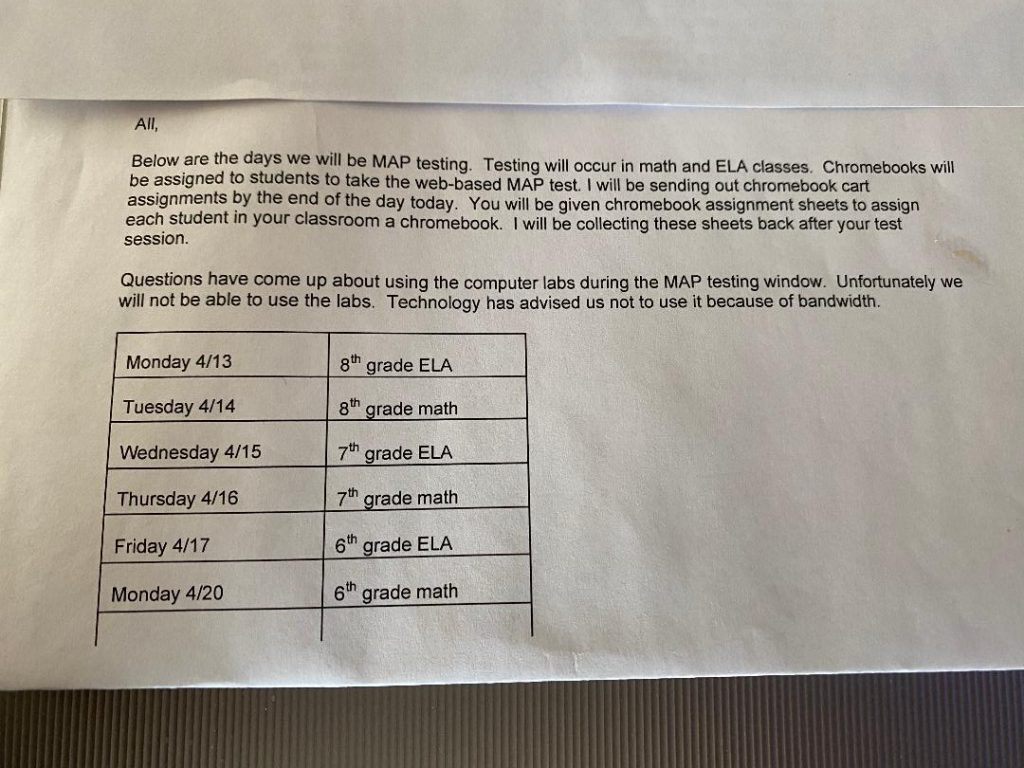
Here’s my starting truth: The hare will always beat the tortoise when the race is short and timed.
In the US, students who have grown up with access to keyboards and QWERTY keyboard practice enter the game at an undefined and unquantifiable advantage. Slow test takers can lose points simply because of their need to hunt and peck at keys. UNTIL THE TECH GAP IS CLOSED, WE WON’T BE ABLE TO ACCURATELY JUDGE THE ACHIEVEMENT GAP. One of the best students I ever had — valedictorian for her high school — got a nineteen on her ACT.* That low score was about her typing speed and nothing else but her typing speed. My former student has the ability to be a rocket scientist. But “Esmeralda” got her first, minimal exposure to proper keyboarding skills toward the end of middle school, and her high school only haphazardly emphasized typing speed.
I think it helps to visualize what I am talking about. Reader, your fingers probably automatically hit the keys when you are typing. You don’t think about letter location. I never look at the keyboard unless a mistake pops onto my screen. But suppose your fingers did not automatically find the “p” or “q”? Suppose someone shifted the letters on your keyboard? You would be staring at all the letters on the black rectangle in front of you, trying to pick out what you need. And the problem here is not simply time loss. Yes, it takes a while to find the letter “p” if you don’t know it’s location, but while you are searching you are also multitasking. Your attention has been diverted away from the test problem to the more immediate problem of getting your answer down.
We know multitasking affects performance and work quality. “Indeed, performing several decisive tasks in parallel reduces your overall performance by 20 to 50% while extending the completion time from 30% to 200% and multiplying the number of errors made. All this causes intense and lasting mental exhaustion,” according to Multitasking in Project Management | Reasons to Avoid Multitasking (businessstudynotes.com)
Eduhonesty: I consider it ironically possible that the aggressive push to get technology into the hands of disadvantaged students may help make up for COVID learning loss. For younger students, this push may even end up closing the achievement gap somewhat despite that learning loss. Our younger Esmeraldas are learning to type early enough so that their ability to rocket across a keyboard may only minimally affect their actual final test score results when they are older.
But in the meantime, that push may also create the appearance of progress where progress does not exist. Improved keyboarding skills have the potential to raise scores because students can supply more information more quickly. The speed with which students can get their answers down when testing can make all the difference to scores, especially for students who naturally write more slowly. But when scores go up due to speed alone — the resulting score increase might disguise learning loss.
The GIGANTIC point that gets lost today is that standardized test scores haven’t been close to trustworthy since we went to computerized testing. “Them as Gits” have had those keyboards at home, crawling up into laps to use them before they even started school. In homes with less disposable income, the keyboard was nonexistent and the internet connection was usually a phone. Phones provide information. They do not provide test practice.
Note for teachers as they start attending the year’s staff meetings: How can we get keyboarding skills out front and center as a critical requirement for student success, one that cannot wait? Amazingly enough, those skills still are often treated as adjunct to success, rather than central to success.
Note to the Biden Administration: The nationwide, standardized tests you decided were required to document the status of the achievement gap and COVID learning loss? Those tests will lie to you. And the only way I can see to solve this problem — and get more accurate data — is to return to pencils on paper for now.
*The ACT puts college readiness around 21.
